
Why play organized sports in preschool? It’s true that three and four year-olds may not have the capacity to understand the intricacies of organized sports rules. Their physical abilities are also going to be limited, naturally. They also get great benefits from unstructured play and outdoor play. However, organized games that lead up to traditional sports game rules can be ‘watered down’ for their age. In that way, they can be beneficial for daycare or preschool learning activities, too.
In this article, we’ll give some preschool sports ideas to play in early childhood, and explain the benefits of doing so in the first place.
Benefits of learning preschool versions of organized sports in early childhood
Like we mentioned above, it’s probably not useful to try to teach preschoolers all the rules of organized sports, like baseball, basketball, hockey, soccer, cricket, etc. Instead, so-called, ‘watered down’ versions of these games can be played, to teach the essentials of the ‘big-kid’ games. Why do this? Well, there are a few reasons:
Preschool sports teach kids the skills of organized sports, which they’ll play in school
Altered versions of popular sports games can be a good prepper for later, when kids work their way up to these games on school-age teams or after-school clubs. It will teach them how to dribble a ball, how to run to a base, or how to hit a ball with a bat or stick.
Little tot sports games teach social competence skills
These pseudo sports games for little tots can also teach preschoolers team etiquette and healthy competition (though, according to this resource, any games involving ‘outs’ shouldn’t be introduced at this young age). They can learn how to work together to solve problems, how to be polite with their competitiveness, and how to get along with others.
They can also learn that, it’s totally ok if a game doesn’t go as they expected, or if they fell, or tripped, or didn’t see a ball coming. Because, it’s just a game.
These things can be learned in an age-appropriate environment, too, where mistakes can be made alongside peers who are developing at the same pace, too.
See related on our blog:
- 3 ways early childhood educators can help kids get along and feel included
- How to encourage problem-solving skills in toddlers and young children
- What is social competence in the early years?
Sports can develop healthy, functioning bodies for proper child growth and development
Finally, healthy gross motor skills, as well as good-for-you benefits of being outside or getting exercise can count as reasons to doing this too! For example, physical exercise can help with attention span in the classroom, too. While yes, the kids can get fresh air and exercise from unstructured play, they learn skills in a more specific and repetitive way with organized sports. It also gives these skills a point, and a reason for their little minds to keep working at them.
Eventually, the idea is that kids will learn what they like, and then continue cultivating their skills in a specific sport over time. This can contribute to better health in the long-run.
See related on our blog:
- 4 Top benefits of outdoor education in early childhood
- What is normal gross motor development in early childhood, and why is it important?
What are preschool sports ideas to make games easy for three and four year-olds?

Many community centres may be offering sports programs for the preschool age-group. These can be great places to start your research into ‘what’s new’ for sports games in the ‘little tots’ category.
If you want to play these at home, at daycare or an early childhood learning centre, some ideas include:
- Obstacle courses that introduce skills of various games – (for example, hula hoops to mark ‘bases’ that kids run to if a ball is rolled to them, kicking a balloon or soft ball with a hockey stick at the next station, and so on). Little Kickers is a franchised game that involves these types of obstacle courses for learning soccer. You can watch a video of it on their website, here.
- Catch and throw a ball – practice hand-eye coordination by slowly rolling or throwing a ball below the waist level, and then having another person try to catch it. This can also be done by bouncing a ball against a gymnasium wall.
- Toss a ball into a bucket – this can be a precursor to basketball learning, where the main goal is to practice aiming a ball for a target, like a bucket, or a low-height net (some toy companies make these at very short levels).
- Tee ball – This game introduces the basics of softball, even before softball and little league. It is basically hitting a ball on a stand, with a bat, and running to a base. It’s really cute!
- Tot football – like the name sounds, this is basic football learning for the preschool age-group. It involves foam balls, and teaches basic cooperation skills (like how to stand in line).
- Cricket games – just the basics of learning how to play cricket, which is popular around the world, especially among Indians and former British colonies. Here are ideas.
- Sports game drills – some sports games have common drills for practice, like the ones listed here, for baseball (hot potato sounds fun!). Use these as the main event when taking preschoolers out for age-appropriate sports games.
- Make up your own games with rules – another way to teach the concept of organized sports is to teach that some games have rules and we all have to listen to a coach to be able to play them. These can be extremely simple. For example, go-go-stop, where kids run in circles until the music stops, or a teacher says, “stop!” Anyone who moves might then be able to play as a chaser (so they can still participate). Tag is also a good game for teaching rules.
Be sure that, when you play organized sports with kids, you are considering their age group. Don’t use hard balls, for instance, that can really hurt them. Always throw and catch at very low levels, and not too far for them. Use balloons or easy-rolling balls for hockey. Teach kids not to raise their sticks, nor hit each other. And, don’t play games like dodge-ball with the really young ones.
Preschoolers playing organized sports should be fun and developmental, most of all
Remember, when playing organized sports with preschoolers, the idea is not to win, nor to perfect their ability to ‘go pro.’ Adults also must recognize that children simply do not have the skillset to do advanced moves. So, throwing high or far, kicking at a certain angle, or maneuvering a ball with a stick is not going to be easy at first. The environment for playing sports in childhood – especially for preschoolers – should be all positive, and fun, fun, fun. If a kid is feeling left out, or overwhelmed, address it right away. Get the team to help out, too.
Also keep in mind that some of these kids may have been exposed to these sports at home, or may have never heard of them. Sports can be very cultural too. Older siblings obsessed with soccer can have a big impact on their younger siblings. So, you may have different skill levels in your group. Use that to your advantage, by asking the skilled kids to help coach or teach. But try to avoid letting their advanced abilities interfere with the others having fun.
Related posts on our blog:
